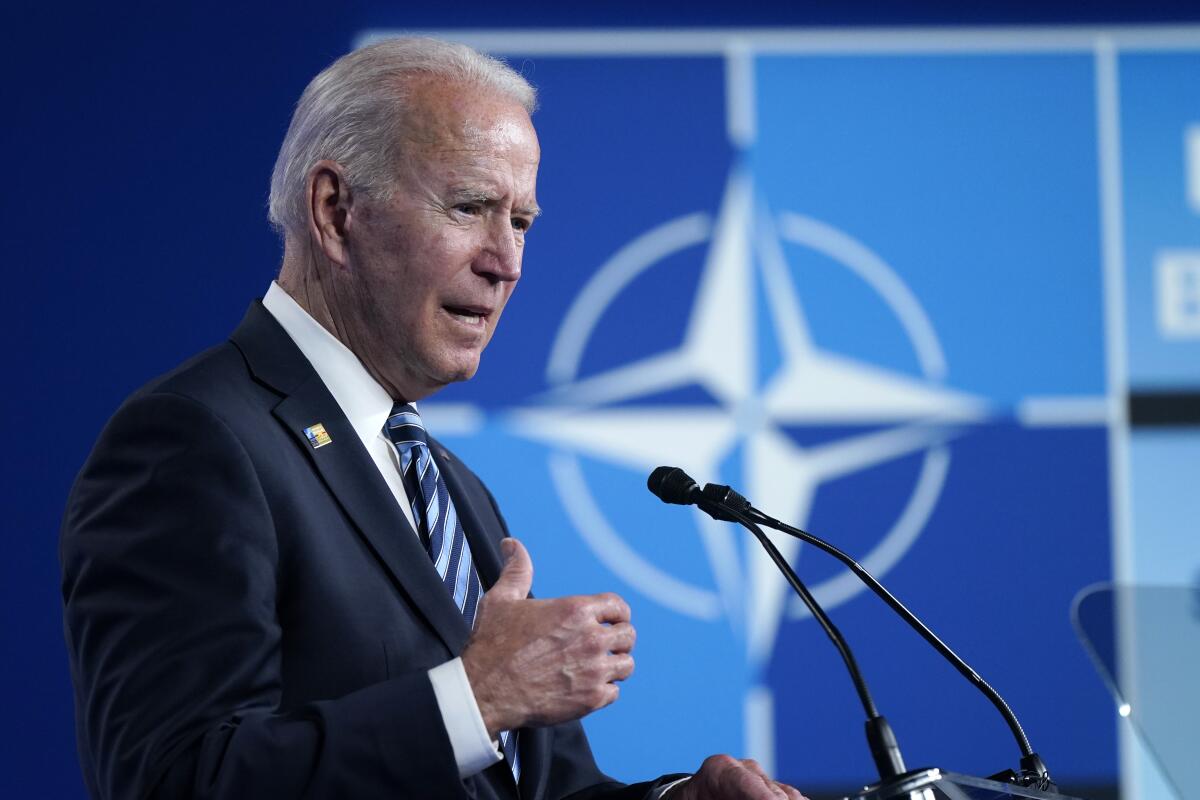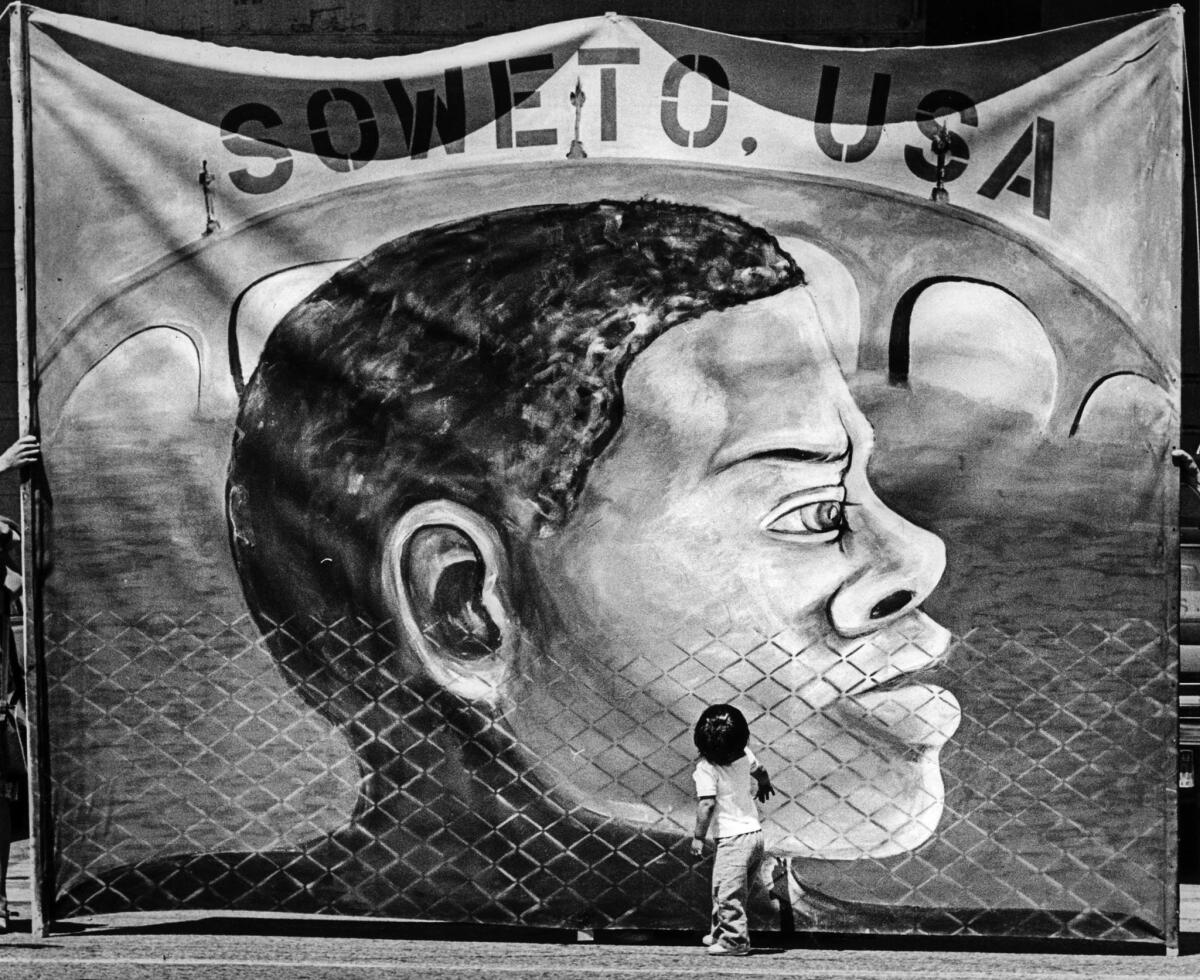Today’s Headlines: Biden’s diplomacy at work

- Share via
President Biden tries to rebuild bridges with the United States’ NATO allies, as his first overseas trip as president continues.
TOP STORIES
Biden’s Diplomacy at Work
President Biden is trying to repair critical ties with the North Atlantic Treaty Organization, an alliance set in place to preserve global peace since World War II. His predecessor branded NATO “obsolete” and wondered out loud why he should send U.S. troops to defend countries he apparently had barely heard of.
On Monday, Biden claimed initial success in mending NATO bonds. “Everyone in that room today understood the shared appreciation that, quite frankly, America is back,” Biden said in a news conference in Brussels after his meetings with about 30 NATO member leaders. Biden acknowledged he got an earful from some allies, who said they were “shocked” at the Jan. 6 Capitol riot by a pro-Trump mob attempting to stop certification of the presidential election.
Start your day right
Sign up for Essential California for the L.A. Times biggest news, features and recommendations in your inbox six days a week.
You may occasionally receive promotional content from the Los Angeles Times.
Before traveling to Brussels, where NATO and European Union headquarters are, Biden drew a clear distinction between himself and Trump, whose threat to withdraw the U.S. from the organization if other members didn’t immediately boost defense spending threw the last NATO summit in 2018 into disarray.
Biden also said NATO allies supported his decision to meet with Russian President Vladimir Putin later this week.
The administration stresses that affirming U.S alliances in multiple venues — NATO, the EU and the G-7 — will strengthen Biden’s hand as he heads into what will be the most challenging encounter of the trip.
More Politics
— The Justice Department’s top national security official is resigning after revelations that the department secretly seized records from Democrats and members of the media.
— The Supreme Court ruled that Congress’ repeal of the harsh mandatory-minimum prison terms for those convicted of dealing crack cocaine does not help those given long sentences because they sold small amounts of the drug three times.
Reopening Day
California is set to fully reopen its economy today. So what will really change? A lot. Californians who are fully vaccinated for COVID-19 will be able to stop wearing face masks in most situations, unless a business or venue decides to keep masks mandatory for everyone. Restaurants and bars will once again be allowed full capacity as well.
Though there’s plenty of reason for confidence in the months to come, a lot could still go wrong too, with variants, vaccine skepticism and inequities around the state.
And then there’s the question of how business can get back to usual. Consumer behavior veered sharply during the pandemic, and soon we’ll see whether these changes endure, or if they too will fade.
Case in point: a stretch of Valley Boulevard in the San Gabriel Valley that has long been a mecca of Chinese dining and shopping. It is far from certain whether Valley will regain its old bustle and sense of possibilities, even as it emerges in a new form altered by the pandemic.
More Top Coronavirus Headlines
— Vaccine maker Novavax said its shot was highly effective against COVID-19 and also protected against variants in a large study in the U.S. and Mexico.
— With a centralized vaccine passport system too politically charged for the federal government to take on, several companies are trying to fill the void for states, businesses and institutions. That might mean Americans end up with several digital passes.
— As the United States’ COVID-19 death toll nears 600,000, racial gaps persist. Now, even as the outbreak wanes and more people get vaccinated, Black Americans are dying at higher rates than other groups.
Natural Calamities in Northern California
California is known for its history of natural disasters. In Silicon Valley, two potential calamities — droughts and earthquakes — are converging to dry up water supplies in the state’s tech economy hub.
In a meeting on Wednesday, board members of the Santa Clara Valley Water District voted unanimously to declare a water shortage emergency — in part because a key county reservoir had to be drained to reduce earthquake risks highlighted by federal regulators.
Unlike Southern California, the Bay Area doesn’t have a dominant water agency that delivers supplies across multiple counties. In Santa Clara, the valley water district serves 15 cities and about 2 million residents, relying on a “robust water portfolio” of reservoirs, groundwater supplies and contracts with state and federal water projects.
To preserve supplies, the district calls for a mandatory 33% reduction in water use compared with 2013 and is planning to rely almost entirely on groundwater, said Tony Estremera, the valley water district’s board chair. But if too much groundwater is tapped, the ground is likely to sink, he said, challenging the structural integrity of roads, bridges and buildings.
Sign up for Unshaken, our six-week newsletter course on earthquake preparation.
'The Times' podcast
Our new weekday podcast, hosted by columnist Gustavo Arellano, takes listeners beyond the headlines. Subscribe on Apple Podcasts and follow on Spotify.
FROM THE ARCHIVES
In 1987, the Los Angeles Police Department embarked on a major crackdown on homeless encampments on skid row. In response, Mayor Tom Bradley proposed a temporary site to relocate the homeless.
In a June 4 Los Angeles Times article from that year, Penelope McMillan and Roxanne Arnold reported:
In an effort to supply short-term housing for residents of sidewalk encampments on Skid Row who face a police crackdown starting today, Mayor Tom Bradley proposed Wednesday a temporary “urban campground” on vacant land downtown near the Los Angeles River.
On June 15, 1987, the urban campground opened. Within two weeks, about 500 homeless people were at the site. Social service agencies sought to help. Schooling and day care were provided for the children.
But the site closed on Sept. 25, 1987, and as a Times article that day put it, “No one calls the attempt a success — not the city, the Salvation Army or advocates for the homeless.”

CALIFORNIA
— To Irvine detectives, Cheng Zhang’s story initially strained belief. His wife and stepdaughter were missing — kidnapped from their apartment, he said — and he had waited more than a week to report it. But 18 months later, police say his story appears to check out.
— A minivan exploded on a street in Montclair, tearing the roof off the vehicle and briefly knocking out power in an incident that the FBI is investigating.
— San Diego police are on pace this year to nearly double the number of “ghost guns” — firearms assembled by hand and usually untraceable — that they impounded last year, according to a new report on the proliferation of such weapons in the city.
— A heat wave that is blanketing the Southland will bring triple-digit temperatures this week, prompting the National Weather Service to issue an excessive heat warning.
Support our journalism
Subscribe to the Los Angeles Times.
NATION-WORLD
— Myanmar’s ousted leader Aung San Suu Kyi went on trial on charges that many observers say are an attempt by the junta that deposed her to eliminate her as a political force, erase the country’s democratic gains and cement the military’s power.
— British Prime Minister Boris Johnson confirmed that the next planned relaxation of coronavirus restrictions in England would be delayed by four weeks. The delay would be until July 19, a decision he said will save thousands of lives as the government speeds up its vaccination drive.
— The Girl Scouts have an unusual problem this year: 15 million boxes of unsold cookies.
— A Pekingese named Wasabi won best in show Sunday night at Westminster Kennel Club dog show, notching a fifth-ever win for the toy breed.
HOLLYWOOD AND THE ARTS
— Lin-Manuel Miranda, who conceived and wrote the music and lyrics for the stage hit “In the Heights,” has apologized for the lack of Afro-Latinx representation in the film adaptation, directed by John M. Chu.
— For new hosts of the “Bachelorette,” stepping in for Chris Harrison is “very needed” as the franchise enters a new era.
— For 95 days, celebrity fitness trainer Amanda Kloots attracted the world’s attention while her husband, actor Nick Cordero, was in the ICU battling complications from COVID-19. It’s the subject of her new memoir.
— While you were in quarantine, a major new art museum rose in Orange County.
BUSINESS
— Welcome to the summer of quitting. Many Americans are saying goodbye to their jobs, shifting careers and priorities after a pandemic year. And for those who haven’t taken the plunge yet, here’s a guide to getting started.
— Just six weeks out, it’s still not clear whether the Tokyo Summer Olympics will take place. NBCUniversal is betting they will — and will finally get to cash in on a marquee moment and moneymaker for its TV networks.
SPORTS
— The Clippers have evened their NBA playoff series with a Game 4 win over the Utah Jazz, punctuated by Kawhi Leonard’s dunk.
— On California’s reopening day, here’s everything sports fans can do under the Southern California sun.
Free online games
Get our free daily crossword puzzle, sudoku, word search and arcade games in our new game center at latimes.com/games.
OPINION
— Big Tech is broken. Deputy editorial page editor Jon Healey asks, “Can Congress fix it?”
— Removing Metro fares will make public transit accessible, but it won’t fix bad service, writes Jireh Deng, a 2021 summer Editorial Pages and Op-Ed intern at The Times.
WHAT OUR EDITORS ARE READING
— Ohio’s criminal justice system mishandled 15-year-old Alexis Martin’s case. Now the sex trafficking victim championed by Kim Kardashian is living with the consequences. (The Washington Post)
— Let’s talk about “In the Heights” and the erasure of dark-skinned Afro-Latinx folks. (The Root)
— Willie Hudspeth protested the Confederate monument in his Texas town almost every Sunday for 21 years. His vigils inspired a reckoning about Denton’s past, including the forced relocation of the once-thriving Black community known as Quakertown. (Insider)
ONLY IN L.A.
Rap icon Dr. Dre and music industry mogul Jimmy Iovine hated school — really hated school — which makes them an unlikely force behind a new public high school project in Los Angeles. Both reportedly billionaires, they said they would do and spend whatever is necessary to make the school, which will be in South L.A., successful and sought after — and a place that will motivate students to be critical thinkers, entrepreneurs and innovators. The move represents a rare investment by the entertainment elite in the nation’s second-largest school system, where more than 80% of students are Black and Latino and about the same number come from low-income households. The school will join a relatively short list of education projects initiated by the wealthy from sports or entertainment.
For the record: Monday’s newsletter stated that this year’s Group of 7 talks took place in Wales; they were held in the county of Cornwall, England.
Comments or ideas? Email us at headlines@latimes.com.
Sign up for Essential California
The most important California stories and recommendations in your inbox every morning.
You may occasionally receive promotional content from the Los Angeles Times.





